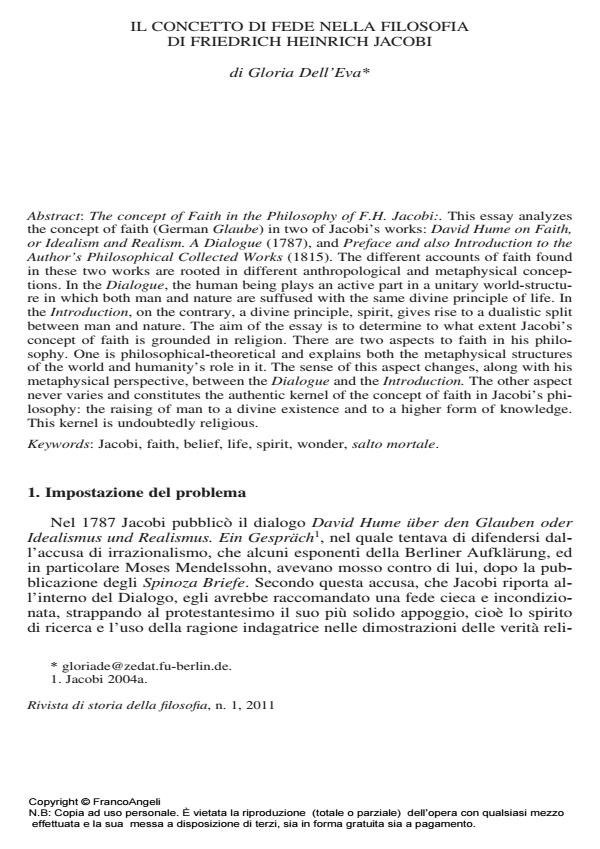The concept of Faith in the Philosophy of F.H. Jacobi
Journal title RIVISTA DI STORIA DELLA FILOSOFIA
Author/s Gloria Dell'Eva
Publishing Year 2011 Issue 2011/1
Language Italian Pages 24 P. 39-62 File size 840 KB
DOI 10.3280/SF2011-001003
DOI is like a bar code for intellectual property: to have more infomation
click here
Below, you can see the article first page
If you want to buy this article in PDF format, you can do it, following the instructions to buy download credits

FrancoAngeli is member of Publishers International Linking Association, Inc (PILA), a not-for-profit association which run the CrossRef service enabling links to and from online scholarly content.
This essay analyzes the concept of faith (German Glaube) in two of Jacobi’s works: David Hume on Faith, or Idealism and Realism. A Dialogue (1787), and Preface and also Introduction to the Author’s Philosophical Collected Works (1815). The different accounts of faith found in these two works are rooted in different anthropological and metaphysical conceptions. In the Dialogue, the human being plays an active part in a unitary world-structure in which both man and nature are suffused with the same divine principle of life. In the Introduction, on the contrary, a divine principle, spirit, gives rise to a dualistic split between man and nature. The aim of the essay is to determine to what extent Jacobi’s concept of faith is grounded in religion. There are two aspects to faith in his philosophy. One is philosophical-theoretical and explains both the metaphysical structures of the world and humanity’s role in it. The sense of this aspect changes, along with his metaphysical perspective, between the Dialogue and the Introduction. The other aspect never varies and constitutes the authentic kernel of the concept of faith in Jacobi’s philosophy: the raising of man to a divine existence and to a higher form of knowledge. This kernel is undoubtedly religious.
Keywords: Jacobi, faith, belief, life, spirit, wonder, <i>salto mortale</i>
Gloria Dell'Eva, Il concetto di fede nella filosofia di Friedrich Heinrich Jacobi in "RIVISTA DI STORIA DELLA FILOSOFIA" 1/2011, pp 39-62, DOI: 10.3280/SF2011-001003